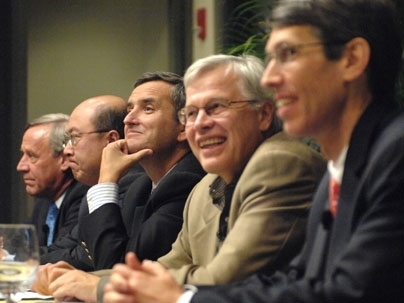A panel of five MIT faculty experts in economics and business analyzed the ongoing financial crisis in the U.S. and world markets at a special session Oct. 8 that filled lecture hall 10-250 to capacity and extended to two overflow auditoriums.
Video of the event
The panelists focused on different aspects of the history, the present unfolding, and the likely future of the financial mess, and emphasized that the situation is far more complex — and the long-term outcome more uncertain — than is typically portrayed.
"The popular story is way too simplistic," said Ricardo Caballero, Ford International Professor of Economics, Macroeconomics and International Finance and head of the economics department, who organized and moderated the panel.
For one thing, he said, the crisis has been brewing much longer than many people realize. "Things began to change quite dramatically in the summer of 2007," he said, as house values began to flatten out or decline after years of rapid escalation. That's when new financial instruments became widespread that packaged mortgages of varying risk levels into forms that made it difficult to assess their underlying value.
But while the loss of value of these instruments caused investors to panic and began a downward spiral in financial markets that has unfolded over the last year, "the impact of the financial crisis on the real economy, Main Street, had remained contained until only a couple of weeks ago," Caballero said. "All this changed on Sept. 15," when investment bank Lehman Brothers declared bankruptcy and the government decided not to step in to save it. "This changed entirely the dynamics of the game."
William Wheaton, professor of economics and urban studies and director of research for the Center for Real Estate, stressed that part of the reason for the real estate bubble — and its resulting collapse — had to do with an excess of capital globally. Much of that ended up going into American real estate, as a result of these financial instruments that bundled mortgages in a way that was perceived as greatly reducing the risks involved. That influx added to the pressure for lenders to offer more loans "to people who were incredibly more risky," he said.
While the averaging out created by these securities helped to smooth out the risks of individual mortgages, Wheaton said, that process "really offers no advantage against systematic risk," such as the overall downturn in housing prices — an event he compared to a "100-year flood" in economic terms. But the storm was created in large part, he said, by an excessive boom of housing construction while the prices were rising. "I actually think it was oversupply" of housing that caused much of the problem, Wheaton said.
To fix the problem, he said, in economic terms it is more important to stabilize house prices than it is to keep people in their homes. While that may seem cold, he said, much of the boom was fueled by what he called "marginal" buyers — those buying second homes or investment properties on speculation, who had no strong attachment to the properties. The current slump in home construction, he said, may actually be good for restoring the economy.
Andrew Lo, Harris & Harris Group Professor of Finance and director of the MIT Laboratory for Financial Engineering at the MIT Sloan School of Management, said the underlying concept of "securitization" of mortgages — the creation of a secondary market in mortgage-backed paper that helped to create definable levels of risk — "is a good one, in fact a brilliant one." The problem came when investors around the world began to see these instruments as being so safe that they used excessive leverage to buy into them.
When prices began to fall, though, "when markets are under duress, it's very hard to set values," and liquidity of these assets began to freeze up. Fear has taken hold of the markets, he said, and since "fear by definition does not have to be rational," it's hard to predict the near-term future. "We will be able to get through this, if we can get over the next few weeks," Lo said. In fact, we will "be stronger and better for it."
Bengt Holmstrom, the Paul A. Samuelson Professor of Economics, said that contrary to widespread belief, greed on Wall Street, "I don't think is the real problem." Rather, he said, politicians share much of the blame. "Pressure came from the top, from politicians who wanted to increase lending to poor families." While prices were booming, "everybody wanted to get into this game."
While the focus now is on having the government step in to buy up the "toxic" bad loans, Holmstrom suggested it might be wiser for them to channel fresh capital into 100 of the best, strongest banks, and let some of the weaker ones fail.
James Poterba, the Mitsui Professor of Economics, said that trying to deal with the economic crisis while in the midst of the present turmoil is a bit like trying to keep species alive amidst the swirling dust and debris after an asteroid hits the planet. "We have really shaken to the core the role of the state," he said.
But Poterba, who is also the president and chief executive officer of the National Bureau of Economic Research, said he takes some comfort from the fact that one of those working on handling the crisis is Federal Reserve head Ben Bernanke, who earned his PhD from MIT and much of whose research was on the Great Depression. "He's one of the best people you want to see" in the midst of a crisis like this, he said.
He also emphasized that much of what is seen as spending by the government in this situation is really just a transfer of assets, and that in many cases the government may actually profit from these "bailout" moves.
Video of the event
The panelists focused on different aspects of the history, the present unfolding, and the likely future of the financial mess, and emphasized that the situation is far more complex — and the long-term outcome more uncertain — than is typically portrayed.
"The popular story is way too simplistic," said Ricardo Caballero, Ford International Professor of Economics, Macroeconomics and International Finance and head of the economics department, who organized and moderated the panel.
For one thing, he said, the crisis has been brewing much longer than many people realize. "Things began to change quite dramatically in the summer of 2007," he said, as house values began to flatten out or decline after years of rapid escalation. That's when new financial instruments became widespread that packaged mortgages of varying risk levels into forms that made it difficult to assess their underlying value.
But while the loss of value of these instruments caused investors to panic and began a downward spiral in financial markets that has unfolded over the last year, "the impact of the financial crisis on the real economy, Main Street, had remained contained until only a couple of weeks ago," Caballero said. "All this changed on Sept. 15," when investment bank Lehman Brothers declared bankruptcy and the government decided not to step in to save it. "This changed entirely the dynamics of the game."
William Wheaton, professor of economics and urban studies and director of research for the Center for Real Estate, stressed that part of the reason for the real estate bubble — and its resulting collapse — had to do with an excess of capital globally. Much of that ended up going into American real estate, as a result of these financial instruments that bundled mortgages in a way that was perceived as greatly reducing the risks involved. That influx added to the pressure for lenders to offer more loans "to people who were incredibly more risky," he said.
While the averaging out created by these securities helped to smooth out the risks of individual mortgages, Wheaton said, that process "really offers no advantage against systematic risk," such as the overall downturn in housing prices — an event he compared to a "100-year flood" in economic terms. But the storm was created in large part, he said, by an excessive boom of housing construction while the prices were rising. "I actually think it was oversupply" of housing that caused much of the problem, Wheaton said.
To fix the problem, he said, in economic terms it is more important to stabilize house prices than it is to keep people in their homes. While that may seem cold, he said, much of the boom was fueled by what he called "marginal" buyers — those buying second homes or investment properties on speculation, who had no strong attachment to the properties. The current slump in home construction, he said, may actually be good for restoring the economy.
Andrew Lo, Harris & Harris Group Professor of Finance and director of the MIT Laboratory for Financial Engineering at the MIT Sloan School of Management, said the underlying concept of "securitization" of mortgages — the creation of a secondary market in mortgage-backed paper that helped to create definable levels of risk — "is a good one, in fact a brilliant one." The problem came when investors around the world began to see these instruments as being so safe that they used excessive leverage to buy into them.
When prices began to fall, though, "when markets are under duress, it's very hard to set values," and liquidity of these assets began to freeze up. Fear has taken hold of the markets, he said, and since "fear by definition does not have to be rational," it's hard to predict the near-term future. "We will be able to get through this, if we can get over the next few weeks," Lo said. In fact, we will "be stronger and better for it."
Bengt Holmstrom, the Paul A. Samuelson Professor of Economics, said that contrary to widespread belief, greed on Wall Street, "I don't think is the real problem." Rather, he said, politicians share much of the blame. "Pressure came from the top, from politicians who wanted to increase lending to poor families." While prices were booming, "everybody wanted to get into this game."
While the focus now is on having the government step in to buy up the "toxic" bad loans, Holmstrom suggested it might be wiser for them to channel fresh capital into 100 of the best, strongest banks, and let some of the weaker ones fail.
James Poterba, the Mitsui Professor of Economics, said that trying to deal with the economic crisis while in the midst of the present turmoil is a bit like trying to keep species alive amidst the swirling dust and debris after an asteroid hits the planet. "We have really shaken to the core the role of the state," he said.
But Poterba, who is also the president and chief executive officer of the National Bureau of Economic Research, said he takes some comfort from the fact that one of those working on handling the crisis is Federal Reserve head Ben Bernanke, who earned his PhD from MIT and much of whose research was on the Great Depression. "He's one of the best people you want to see" in the midst of a crisis like this, he said.
He also emphasized that much of what is seen as spending by the government in this situation is really just a transfer of assets, and that in many cases the government may actually profit from these "bailout" moves.






